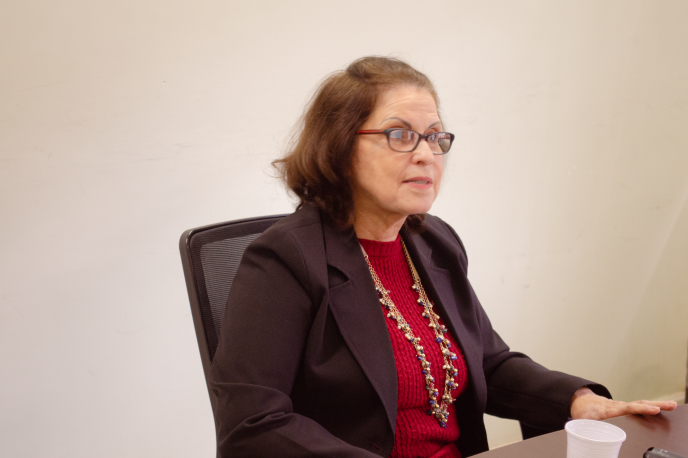
Professor Glaucia Muniz Proença Lara, from the Faculty of Letters at UFMG
Photo: Yan Marques – IEAT/UFMG
Professor Glaucia Muniz Proença Lara, from the Faculty of Letters at UFMG, presented the project Migrants and refugees in Brazil: between life narratives, laws and public policies at the fourth meeting of the IEAT 2025 Residents’ Exhibition, held on May 28, 2025, at Administrative Unit 3 at UFMG.
A linguist and researcher of French Discourse Analysis (AD), Professor Glaucia Muniz Proença Lara began her presentation by talking about her academic career, which began with her undergraduate and master’s degrees at UFMG and followed by a doctorate in Semiotics and General Linguistics at the University of São Paulo (USP), with a one-year doctoral internship at the University of Paris X – Nanterre, in France. Glaucia also completed three post-doctorates in Discourse Analysis, the most recent of which (2019-2020) resulted in the books Living on the other side of the Atlantic: stories of Brazilians in Portugal, released in 2021 by Grácio Editor (Coimbra – Portugal), and Between experiences and memories: life narratives of Brazilian migrants in Europe, published in 2023 by Editora Pontes.
Glaucia said she had the first insight to begin her research with migrants and refugees while still in France, in 2015, when the photograph of Alan Kurdi, a three-year-old Syrian boy found dead on a beach, moved the world. Before delving into the theme of her research project, however, Glaucia presented a brief history of linguistics, which has its first records in evolutionary studies of languages in the 19th century (historical linguistics), but which emerged as modern linguistics in the 20th century, with Ferdinand de Saussure. She explained that this author focused on investigating language as a system, a structure, without worrying about the study of speech, which was considered variable and circumstantial.
Noam Chomsky’s generative grammar, developed in the late 1950s, also follows a similar path when it considers that the linguist should study the competence that the speaker has and not the actual performance of that speaker. In other words, linguistics should only deal with the set of rules, of principles that the speakers of a given language internalize.
This gap in the study of the real situation of language use gave rise to other disciplines, such as sociolinguistics, pragmatics and enunciation theory, which, privileging heterogeneity and diversity, sought to systematize the concrete uses of language by real speakers.
This is the field in which discourse analysis fits in, which, according to the researcher, seeks to understand not only what is said, but also what is unsaid and what has already been said. To conclude the first part of the presentation, Glaucia highlighted that the theoretical field of discourse analysis relates linguistic and social (cultural) aspects, focusing on the text/context relationship and taking into account both the statement and the enunciation.
Glaucia then gave more details about her research subject, demonstrating the relevance of the topic. She explained the conceptual dichotomy between migrants and refugees, which, according to her, is difficult to establish in practice. If migrants are individuals who voluntarily leave for a new country, even if it is to escape hunger and poverty, and refugees are those who migrate due to armed conflicts or persecution and human rights violations, there are many cases that challenge this separation between forced and voluntary migration.
Presenting data on migration in the world, Glaucia Muniz highlighted the urgency of the issue. She then gave details on Brazilian legislation regarding this issue, speaking of law no. 9474/97, which implements the Refugee Statute of the Geneva Convention (1951), and law no. 13445/17, which advances human rights. According to her, although public policies have advanced, humanitarian support for migrants and refugees in Brazil still falls mainly on Non-Governmental Organizations (NGOs) and other civil society bodies.
Using examples from the reality of life for migrants and refugees in Brazil, Glaucia Muniz outlined the proposed research path, focusing on analyzing, in light of French discourse analysis, the stories of migrants and refugees living in the city of Belo Horizonte. Based on interviews – considered as life narratives – the research will seek to understand how these individuals are welcomed and integrated in Brazil, in particular, whether the State and assistance policies are able (or not) to meet the needs for support and inclusion. For Glaucia Muniz, the purpose of the research is to deepen the analysis of how this welcome/integration occurs and how it relates directly or indirectly, in a second phase of the research, to the legal provisions that deal with the rights of displaced individuals in Brazilian territory.
Finally, Glaucia Muniz said that the research also seeks to raise awareness of the problem of welcoming and integrating migrants and refugees in the country. “The life stories of those interviewed will be shared through events and publications with the aim of raising awareness in society about this problem,” she highlighted.